- Home
- Barbara Kingsolver
Pigs in Heaven Page 2
Pigs in Heaven Read online
Page 2
"I'm on a tour of monuments to the unlucky." He nods at the marble slab.
Taylor is curious about his hobby but decides not to push it. They leave him to the angels and head for the museum. "Do not sit on wail," Turtle says, stopping to point at the wall. She's learning to read, in kindergarten and the world at large.
"On wall," Taylor says. "Do not sit on wall."
The warning is stenciled along a waist-high parapet that runs across the top of the dam, but the words are mostly obscured by the legs of all the people sitting on the wall. Turtle looks up at her mother with the beautiful bewilderment children wear on their faces till the day they wake up knowing everything.
"Words mean different things to different people," Taylor explains. "You could read it as 'Don't sit on the wall.' But other people, like Jax for instance, would think it means 'Go ahead and break your neck, but don't say we didn't warn you.' "
"I wish Jax was here," Turtle says solemnly. Jax is Taylor's boyfriend, a keyboard player in a band called the Irascible Babies. Taylor sometimes feels she could take Jax or leave him, but it's true he's an asset on trips. He sings in the car and is good at making up boredom games for Turtle.
"I know," Taylor says. "But he'd just want to sit on the wall. You'd have to read him his rights."
For Taylor, looking over the edge is enough, hundreds of feet down that curved, white wing of concrete to the canyon bottom. The boulders below look tiny and distant like a dream of your own death. She grips her daughter's arm so protectively the child might later have marks. Turtle says nothing. She's been marked in life by a great many things, and Taylor's odd brand of maternal love is by far the kindest among them.
Turtle's cotton shorts with one red leg and one white one flap like a pair of signal flags as she walks, though what message she's sending is beyond Taylor's guess. Her thin, dark limbs and anxious eyebrows give her a pleading look, like a child in the magazine ads that tell how your twenty cents a day can give little Maria or Omar a real chance at life. Taylor has wondered if Turtle will ever outgrow the poster-child look. She would give years off her own life to know the story of Turtle's first three, in eastern Oklahoma, where she's presumed to have been born. Her grip on Turtle is redundant, since Turtle always has a fist clamped onto Taylor's hand or sleeve. They cross through the chaotic traffic to the museum.
Inside, old photos line the walls, showing great expanses of scaffolded concrete and bushy-browed men in overalls standing inside huge turbines. The tourists are being shuffled into a small theater. Turtle tugs her in for the show, but Taylor regrets it as soon as the projector rolls. The film describes the amazing achievement of a dam that tamed the Colorado River. In the old days it ran wild, flooding out everyone downstream, burying their crops in mud. "There was only one solution--the dam!" exclaims the narrator, who reminds Taylor of a boy in a high school play, drumming up self-importance to conquer embarrassment. Mr. Hoover's engineers prevailed in the end, providing Arizona with irrigation and L.A. with electricity and the Mexicans with the leftover salty trickle.
"Another solution is they didn't need to grow their cotton right on the riverbank," Taylor points out.
"Mom!" hisses Turtle. At home Turtle whines when Taylor talks back to the TV. Jax sides with Turtle on the television subject, citing the importance of fantasy. Taylor sides with her mother, who claims over the phone that TV has supernatural powers over her husband. "Just don't believe everything on there is true," Taylor warns often, but she knows this war is a lost cause in general. As far as her daughter is concerned, Mutant Ninja Turtles live in the sewers and that is that.
Outside the museum, a foil gum wrapper skates along the sidewalk on a surprise gust of wind. A herd of paper cups and soda straws rolls eastward in unison. Lucky Buster sits on the ramparts of the Hoover Dam, trying to figure out how to save the day. People will throw anything in the world on the ground, or even in the water. Like pennies. They end up down there with the catfish. There could be a million dollars at the bottom of the lake right now, but everybody thinks there's just one red cent--the one they threw.
Lucky sits very still. He has his eye on a bright red soda-pop can. His friend Otis is an engineer for the Southern Pacific, and he's warned Lucky about pop cans. They catch the sun just right and they'll look like a red signal flare on the tracks. When you see that, you've got to stop the whole train, and then it turns out it's just a pop can. Bad news.
The people are all up above him. One girl is looking. Her round face like a sweet brown pie can see him over the wall. He waves, but she bobs behind the mother and they go away. Nobody else is looking. He could go down there now. The water is too close, though, and scares him: water is black, blue, pink, every color. It gets in your eyes there's so much light. He looks away at the nicer camel hump desert. Now: go.
Lucky drops down and scoots along the gray wall that runs along the edge. One side is water, fish-colored; on the other side you fall into the hole. He is as careful as the circus girls in silver bathing suits on TV, walking on wires. One foot, another foot.
A white bird with scabbed yellow feet lands in front of Lucky. "Ssss," he says to the bird, shaking his hands at it. The bird walks away fast, one spread foot and then the other one. Lucky is two steps away from the pop can. Now one step away. Now he's got it.
The bird turns its head and looks straight at Lucky with a mean eye.
The sun has dropped into the Nevada hills and rung up a sunset the color of cherries and lemons. Turtle and Taylor take one last stroll across Mr. Hoover's concrete dream. Turtle is holding on so tightly that Taylor's knuckles ache. Their hypochondriac friend Lou Ann has warned Taylor about arthritis, but this snap-jawed grip is a principle of their relationship; it won Turtle a nickname, and then a mother. She hasn't deliberately let go of Taylor since they met.
The water in the shadow of the dam is musky green and captivating to Turtle. She yanks on Taylor's fingers to point out huge catfish moving in moss-colored darkness. Taylor doesn't really look. She's trying to take in the whole of Lake Mead, the great depth and weight of water that formerly ran free and made life miserable for the downstream farmers. It stretches far back into the brown hills, but there is no vegetation along the water's edge, just one surface meeting another, a counterfeit lake in the desert that can't claim its own shoreline. In the distance someone is riding a kind of small water vehicle that seems pesty and loud for its size, like a mosquito.
Storm clouds with high pompadours have congregated on the western horizon, offering the hope of cooler weather, but only the hope. The Dodge when they get back to it is firecracker hot and stinks of melted plastic upholstery. Taylor opens both front doors and tries to fan cooler air onto the seat. The ice-cream cone she bought Turtle was a mistake, she sees, but she's not an overly meticulous parent. She's had to learn motherhood on a wing and a prayer in the last three years, and right now her main philosophy is that everything truly important is washable. She hands Turtle a fistful of fast-food napkins from the glove compartment, but has to keep her eyes on the road once they get going. The Dodge Corona drives like a barge and the road is narrow and crooked, as bad as the roads she grew up risking her neck on in Kentucky.
Eventually they level out on the Nevada plain, which looks clinically dead. Behind them the lake stretches out its long green fingers, begging the sky for something, probably rain.
Turtle asks, "How will he get out?"
"Will who get out?"
"That man."
"Which man is that, sweetheart?" Turtle isn't a big talker; she didn't complete a sentence until she was four, and even now it can take days to get the whole story. "Is this something you saw on TV?" Taylor prompts. "Like the Ninja Turtles?"
"No." She looks mournfully at the waffled corpse of her ice cream cone. "He picked up a pop can and fell down the hole by the water."
Taylor narrows her eyes at the road. "At the dam? You saw somebody fall?"
"Yes."
"Where people were sitting, on
that wall?"
"No, the other side. The water side."
Taylor takes a breath to find her patience. "That man out on the lake, riding around on that boat thing?"
"No," Turtle says. "The man that fell in the hole by the water."
Taylor can make no sense of this. "It wasn't on TV?"
"No!"
They're both quiet. They pass a casino where a giant illuminated billboard advertises the idea of cashing your paycheck and turning it into slot-machine tokens.
Turtle asks, "How will he get out?"
"Honey, I really don't know what you mean. You saw somebody fall down a hole by the dam. But not into the water?"
"Not the water. The big hole. He didn't cry."
Taylor realizes what she could mean, and rejects the possibility, but for the half second between those two thoughts her heart drops. There was a round spillway where the water could bypass the dam during floods. "You don't mean that spillway, do you? The big hole between the water and the parking lot?"
"Yes." Turtle's black eyes are luminous. "I don't think he can get out."
"There was a big high fence around that." Taylor has slowed to about fifteen miles an hour. She ignores the line of traffic behind her, although the drivers are making noise, impatient to get to Las Vegas and throw away their money.
"Turtle, are you telling me the absolute truth?"
Before she can manage an answer, Taylor U-turns the Dodge, furious at herself. She'll never ask Turtle that question again.
Hoover's guardian angels are in the dark now. The place is abandoned. They bang on the locked museum doors and Taylor cups her hands to see inside, but it is deserted. A huge blueprint of the dam shows elevators, maintenance towers, and on each side a long spillway looping like a stretched intestine under the dam to the river below. Taylor's own gut feels tight. "They've gone home," she tells Turtle, who won't stop banging the door. "Come on. Show me where he fell."
Turtle is willing to substitute one course of action for another. The legs of her shorts whip against each other as they cross to the Arizona side, where she dripped a trail of ice cream an hour before. "There," she says, pointing down.
Taylor examines the throat of the spillway: a rectangular concrete funnel, maybe fifty feet across, whose lower end narrows into a large round hole.
Dots of car lights twist down the mountain, looking lonely. Out over the lake, bats dip and flutter after mosquitoes. Taylor looks at the dark gullet. "Head first, or feet first?"
Turtle ponders this. "He was walking on there." Her finger projects a line down the retaining wall between lake and spillway. "He picked up a pop can. Then he fell down. Sideways first." Her hand burrows into her shorts pocket, frightened of its own revelations.
Taylor squeezes the other hand. "Don't worry. He's one lucky sucker that you've got such sharp eyes. Did you see him go all the way into the hole?"
Turtle nods.
Taylor feels weak-kneed, as she did looking over the parapet wall. The hardest thing about motherhood, she thinks, is that you can never again be the baby of your family, not even for ten seconds. She tries to sound steady. "Should we yell? Think he might hear us?"
Turtle nods.
Taylor screams: "Anybody in there? Hey!" They listen to the passive response of two million tons of concrete.
Taylor leans farther over the rail and makes a splay-fingered megaphone with her hands, to show Turtle this is fun, and will work. "Hey! Youuu! Hello down there, can you hear me? Heyy! Got two dimes for a nickel? Whooo! Hello!"
From far away over the lake comes the high buzz of a motorboat. Nothing else. Turtle cries without making a sound.
She feels for her mother's fingers, the one sure thing. They are standing in the dark. Taylor makes the round moon of flashlight go all over the policeman in the chair but he doesn't wake up. Behind the metal house are machines with long animal necks, and they are sleeping too.
"Hey, mister," Taylor says, louder. The light slides up his brown shirt and brights out a square name badge. Then his eyes. He wakes up and goes for his gun.
"What the fuck?"
"Excuse me, Mister Decker, but don't shoot us, okay? My daughter here is six and we're real defenseless."
Turtle makes herself feel her mother's hand. The man gets up and switches on a world of light. A motor sings and cries in the metal house. "What the hell you after?"
"We'd like to report an emergency, okay? Somebody fell into the dam. Into the spillway."
Mister Decker stares while all his dreams run away.
"He had on a dark shirt, and a green bandana around his head." Taylor looks down, and Turtle touches her hair.
"And long hair. Dark brown."
"Intoxicated?"
"We don't know. It's not somebody we know, we're just reporting it."
Mister Decker fixes his crotch. "When?"
"Around sunset."
"And you decided to come tell me about it in the middle of the night."
"There's nobody at the museum. It took us forever to find anybody."
"It's fucking Easter Sunday tomorrow. You want a parade?"
"Well, I'm sorry you got stuck on a dog shift, but we're trying to report a human life in danger here."
"Sumbitch."
Taylor clicks her flashlight on and off. "You ever think about a new line of work?"
Mister Decker goes into the shed and makes a phone call. When he comes back out he asks, "Any more I.D. on this guy? How old?"
Taylor asks Turtle, "How old was he?"
Turtle looks inside her forehead. "Big."
"Like, a big kid? Or my age? Or older than me."
"Bigger than a kid. Maybe like you."
Mister Decker's whole body slumps suddenly, like a sack with nothing in it. "Are you telling me you personally didn't see the incident occur?"
"My daughter saw the incident occur."
"She saw it." He looks. "You believe in Santa Claus, honey?"
Turtle finds her mother with the front of her face and doesn't say. Inside her mother she feels the air rising up.
"Sir, you're intimidating your witness here. She saw what she says she saw. My daughter doesn't miss much. When your boss gets here she could tell him how hilarious you looked when we found you up here snoring on your shift. So you want to take some happy pills and try acting a little nicer to us, or what?"
Hugo Alvarez, Decker's boss, looks them over. His office is the kind of no-frills arrangement that goes out of its way to prove the Park Service isn't wasting taxpayers' money. Taylor makes herself sit still in the orange plastic chair while Mr. Alvarez takes down the facts. "Your daughter doesn't look a thing like you," he notes.
She's used to this. Strangers stare at the two of them with that inquiring-minds-want-to-know look, wondering if maybe they've seen that child on a milk carton somewhere. "She's adopted," Taylor says flatly.
"Mexican-American?"
"Indian. Cherokee."
Mr. Alvarez writes this down on his notepad; apparently it's one of the facts.
"The guy might be banged up," Taylor points out. "Could we speed this up at all?"
Mr. Alvarez has a dark fringe around his bald head, and the eyes of an indifferent hound. He states with no apparent emotion, "There's an eight-foot security fence around the spillway."
"We don't know how he got over the fence," Taylor says, trying to match his tone. The fluorescent lights seem abusive at this hour, and she squints, trying to remember the hillside near the dam. "Maybe he came the other way, down the mountain. Or off the lake."
"We have security personnel watching that area like hawks."
"No offense, but we spent the better part of this night looking for one of your hawks."
"It's a holiday weekend."
"Happy Easter," Taylor says. "Let's go hunt some eggs."
Alvarez sighs. "I know you mean well, miss, but it doesn't sound very probable. Somebody else would have seen it. We can't justify calling out a rescue on this unless we ha
ve a witness."
"We have a witness. My daughter is the witness."
Alvarez rubs his nose with his pen and decides not to add anything to his log of facts.
"She's never told a lie in her life," Taylor adds.
"Frankly," he says, "I haven't heard her say anything."
"She doesn't talk much. If you leave out all the bullshit in life, there's not that much left to say, is there?"
Alvarez looks at Decker again and carefully winds his watch. Taylor gets up and walks to the door and back, reining in a real need to kick a chair leg with her cowboy boot. "Do you want me to lie? Do you want me to say I saw it too? If you write that down on your report, then can you call a rescue party?"
"Just tell me what happened. Just the truth."
"Just the truth is: a man fell down the spillway of your wonderful dam, today, right around sunset. My daughter saw him go in, and it would give her a better impression of the human race if you'd act like you give a damn. Because if he dies in there he's going to be just truly dead."
On Sunday, after a few hours of cramped nightmares on the seat of the Dodge, Taylor and Turtle find the head grounds janitor in the employee parking lot coming onto his shift. Taylor likes the looks of his truck: a '59 Ford, cherry. Maybe he'll be the one to listen. She works in the automotive business and has noticed that people who take care of old things usually have some patience.
"Down the spillway?" he asks. "Can't be. We got a fence around that. I saw a guy go right over the top once, down there." Taylor shudders, thinking of that long free-fall. "Middle of the day," he says. "Accident. Your suicides, they mostly hop off at night. Scrambled eggs in the morning."
Taylor is woozy from lack of sleep and could live without the scrambled-egg report. "This guy was about my age. Long hair. He had on overalls and, what else? A bandana."
"A green bandana?" The janitor's face comes on like someone threw a switch behind it. "Tied around his head, like this? And hair like this?" He chops his hand to his shoulder.
Taylor and Turtle nod.
"Oh, hell, that's Lucky Buster." He heads for the spillway.
They follow him. "You know this guy?" Taylor asks.
"Retarded guy. Oh, hell. I can't believe this. When?"
"Last night. You know him?"
"He's been hanging around here a couple weeks. I can't believe this. He was driving me crazy. He's a little kid in his mind, you know what I mean? He has this thing about litter."

 Prodigal Summer: A Novel
Prodigal Summer: A Novel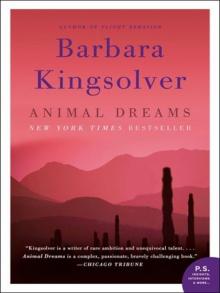 Animal Dreams: A Novel
Animal Dreams: A Novel The Poisonwood Bible
The Poisonwood Bible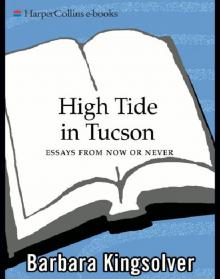 High Tide in Tucson
High Tide in Tucson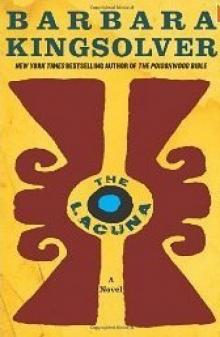 The Lacuna
The Lacuna The Bean Trees
The Bean Trees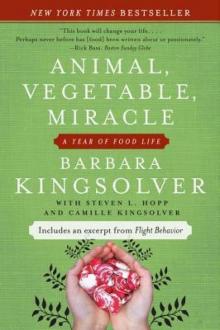 Animal, Vegetable, Miracle: A Year of Food Life
Animal, Vegetable, Miracle: A Year of Food Life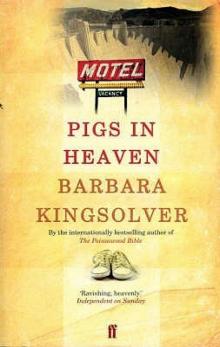 Pigs in Heaven
Pigs in Heaven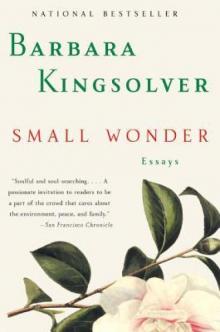 Small Wonder
Small Wonder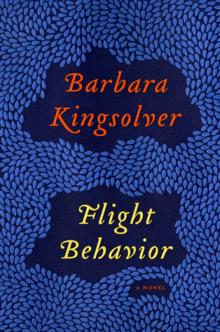 Flight Behavior
Flight Behavior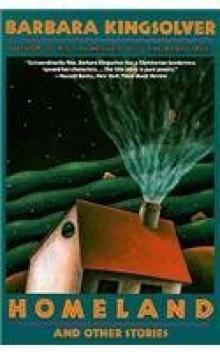 Homeland and Other Stories
Homeland and Other Stories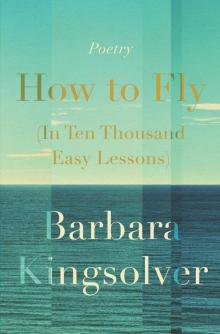 How to Fly (In Ten Thousand Easy Lessons)
How to Fly (In Ten Thousand Easy Lessons) Unsheltered
Unsheltered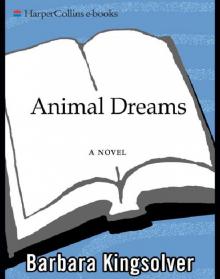 Animal Dreams
Animal Dreams Prodigal Summer
Prodigal Summer Animal, Vegetable, Miracle
Animal, Vegetable, Miracle